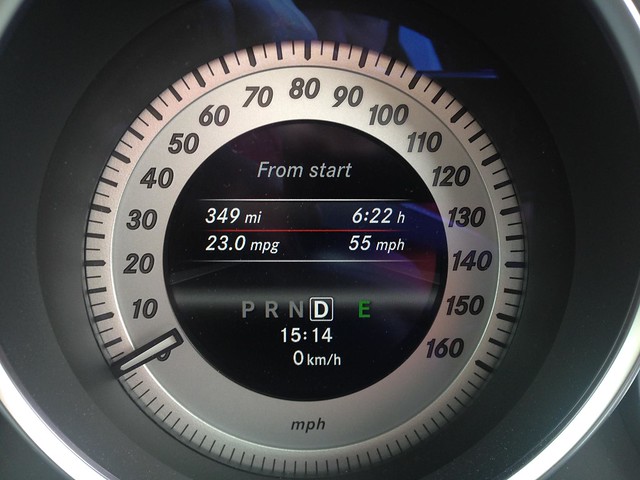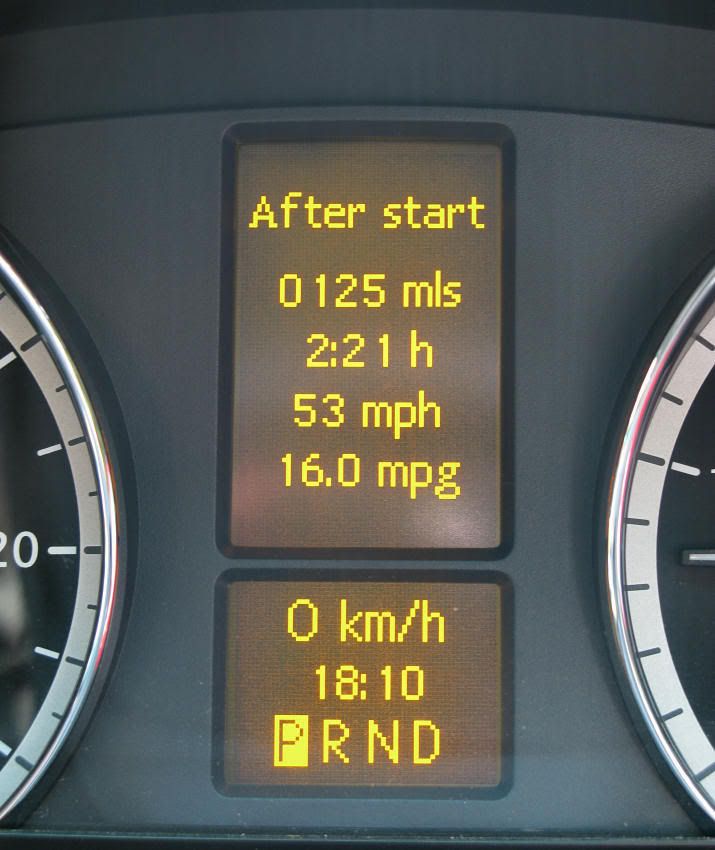A lot depends on aerodynamics - trucks/vans/SUVs etc. have a lot of drag so you save significantly more fuel by driving slower. Cars less so (apart from convertibles with the top down).
Navigation
Install the app
How to install the app on iOS
Follow along with the video below to see how to install our site as a web app on your home screen.
Note: This feature may not be available in some browsers.
More options
You are using an out of date browser. It may not display this or other websites correctly.
You should upgrade or use an alternative browser.
You should upgrade or use an alternative browser.
Page may contain affiliate links. Please see terms for details.
jpwilliams
MB Enthusiast
- Joined
- Dec 23, 2006
- Messages
- 1,050
- Location
- Wirral /Axarqia,Spain
- Car
- W210 DIESEL AUTO EST,LEXUS GS 450h
Hey people
what motorway speeds do you find your car at its best MPG (state what mercedes too)
I cant drive at 60mph its just too slow
C Class Coupe 220 CDI 7G
at 72 mph i get around 54 mpg
70mph @ 2500 REVS= 50+ MPG IN MY 200,000 MILES w210!
Regards
John
stereophoney
Active Member
- Joined
- Dec 10, 2012
- Messages
- 179
- Car
- SLK32, Clio Diesel
225 miles, average speed 51mph = 34.2mpg from a 5.4l v8. Was not the most fun of trips!
best I have managed on a 600 mile round trip last year, not all motorway, but 60% so, was 62.1 mpg. Couple of long trips coming up soon, one of which I am going to not care, the other I am going to give it the light right foot treatment and see what the difference is (and see if I can beat the 62.1!!)
Almost missed the important bit- find 75 seems to work on motorway best and 55/57 on the A roads, depends how many hills etc though with the Hybrid, where I can 'sail'
Almost missed the important bit- find 75 seems to work on motorway best and 55/57 on the A roads, depends how many hills etc though with the Hybrid, where I can 'sail'
Last edited:
C180CGI
Active Member
- Joined
- Apr 11, 2015
- Messages
- 182
- Car
- C180 1.8 CGI 2012 ELEGANCE
On motorway at 70 MPH i get about 45 MPG (OBC figures) and country road 50 MPG at 50 ish MPH. W204 C180 1.8 CGI
- Joined
- Nov 17, 2013
- Messages
- 364
- Location
- Pendle, Lancashire
- Car
- C36 AMG, C55 AMG Estate & CLK55 AMG
I usually get low 50's in my 2013 C220, though last month towing a 8ft box trailer hurt the mpg a little


sjubris
New Member
max 31.07mpg
- Joined
- Nov 17, 2013
- Messages
- 364
- Location
- Pendle, Lancashire
- Car
- C36 AMG, C55 AMG Estate & CLK55 AMG
Ouch, that's nearly as bad as we used to get out of a 6.8Ltr V10 motorhome towing a trailer
carat 3.6
MB Enthusiast
- Joined
- May 11, 2011
- Messages
- 4,035
- Location
- In the workshop
- Car
- S124 E300d wagon, W124 om606 monster, E46 v8 coupe
I think lorries cruise at 56...because they can't go faster.
It really upsets the car drivers if the speed limiter should fail to cut in.
dickycase
New Member
My c270 for the last 7k miles has an average of 51.2 showing on the dash( combined) i commute 100miles a day mostly on motorway and duel carriage ways . On a run to the south of france last year it was just over 56mpg. Not sure how accurate the mpg meter is but not bad for a 155k car!
kid-jensen
MB Enthusiast
Over many years of driving I've found ther biggest improvement you can make to the average MPG on any trip (particularly motorway) is to avoid accellerating up hills. Let the car slow down a bit, who cares?
Downhill, you can use surprising amounts of loud pedal without too much impact on your overall MPG. Do it uphill, and it drops lika a stone.
Still getting used to the ML, but managed to get 35MPG the other day on the M25 (Sunday) and didn't drop below 60 for any significant time.
This is fantasy land for me, and I couldn't be happier. Aerodynamics play their part, and the ML is good in that respedct (Cd), though it has a has a hugh cross-sectional area (CdA) pushing a lot of air out of the way...
I have a long history of owning gas-guzzlers...., this makes a nice change.
Downhill, you can use surprising amounts of loud pedal without too much impact on your overall MPG. Do it uphill, and it drops lika a stone.
Still getting used to the ML, but managed to get 35MPG the other day on the M25 (Sunday) and didn't drop below 60 for any significant time.
This is fantasy land for me, and I couldn't be happier. Aerodynamics play their part, and the ML is good in that respedct (Cd), though it has a has a hugh cross-sectional area (CdA) pushing a lot of air out of the way...
I have a long history of owning gas-guzzlers...., this makes a nice change.
Dryce
Hardcore MB Enthusiast
- Joined
- May 17, 2006
- Messages
- 10,964
- Car
- ..
Tec is right, Lorries cruise at 56 for similar reasons. It's the most speed you can attain before the air gets too thick and the extra distance you cover is disproportional to the drag created.
An interesting take on physics there.
The truck speeds are mentioned in another post.
The drag issue is in principle quite simple.The air doesn't get thick. The drag increases disproportionately with speed - generally it's supposed to be proportional to the cube of the speed.
What this means is that the increasing your speed from 50 to 60 increases the drag by about 70%. So a 20% increase in speed leads to 70% increase in drag.
Now that doesn't necessarily mean your fuel consumption will increase by that amount. The work done by the engine to overcome drag is only a proportion of its fuel burn - but as you go faster it become more significant.
So if say (I'm inventing numbers here) overcoming drag was 30% of the work your engine was doing at 50 then that would simplistically translate into a 20% increase in the work required by the engine to keep the car going at 60 - with 42% of the engine's work being applied to overcoming drag. That's because the 70% increase in drag only applies to that 30% you were using at 50mph.
Things get complicated because there are friction based losses and the setup of the engine and transmission can impact on who efficiently the powertrain works.
And of course if the wind is behind you ....
MancMike
New Member
- Joined
- Jul 29, 2014
- Messages
- 0
Over many years of driving I've found ther biggest improvement you can make to the average MPG on any trip (particularly motorway) is to avoid accellerating up hills. Let the car slow down a bit, who cares?
Downhill, you can use surprising amounts of loud pedal without too much impact on your overall MPG. Do it uphill, and it drops lika a stone.
Exactly. This is why cruise control hurts your MPG sometimes. As it'll maintain your speed no matter what, so accelerating up hills and braking on downwards slopes!
You're right if you can let the car slowly loose speed, then gently raise it back up again is best for mpg. If you're going down hill, you can completely lift off and roll freely, and watch your mpg climb rapidly the longer you can free roll.
Dryce
Hardcore MB Enthusiast
- Joined
- May 17, 2006
- Messages
- 10,964
- Car
- ..
Over many years of driving I've found ther biggest improvement you can make to the average MPG on any trip (particularly motorway) is to avoid accellerating up hills. Let the car slow down a bit, who cares?
I can recall quite a few years ago pointing out that the simplistic lore on hills is wrong.
What you ideally actually want to do is coast up over the hill. Gaining what you lose on the other side. So that fits with the lore of slowing down.
But if your car is having to work to get up the hill then if you remove drag from the equation it makes sense to go up the hill as fast as possible. The reason is that gravity is like constant drag that is not proportional to your speed - so the quicker you get up the less energy you lose to overcoming gravity.
But. If you do introduce drag into the equation then going up faster may gain you something from losses due to gravity - but lose you something as the losses to drag increase. This depends on the drag of the car and the incline of the slope.
Dryce
Hardcore MB Enthusiast
- Joined
- May 17, 2006
- Messages
- 10,964
- Car
- ..
Exactly. This is why cruise control hurts your MPG sometimes. As it'll maintain your speed no matter what, so accelerating up hills and braking on downwards slopes!
Actually - refering to my post on going up hills quickly - one of the reasons cruise control may appear to hurt is that on long inclines it doesn't accelerate and on up and over hills it doesn't know how to coast over the summit.
One thing I've also noticed is that if I'm on CC on a long incline then a lot of cars actually speed up - people basically put their foot down to keep their speed up and overdo it.
Now ironically that can save fuel on a long incline. So the CC at constant speed looks bad - but for the wrong assumed reason.
Again it's not that simple. Basically you're trying to minimise energy use and if you manage to coast perfectly then you eventually end up with the same or greater speed going down the other side as you started with going up.You're right if you can let the car slowly loose speed, then gently raise it back up again is best for mpg. If you're going down hill, you can completely lift off and roll freely, and watch your mpg climb rapidly the longer you can free roll.
If you don't manage that then the trade between saving going up and gaining going down becomes more marginal - a CC might actually win that over a driver trying to optimise - but more by accident.
Last edited:
Bellow
Hardcore MB Enthusiast
Give it some hoof for the last bit of the downhill and use the momentum to carry you up the following incline. Works for me. You can slow to a crawl but it will piss me off if I'm following you and while your mpg will be improved your average speed will be rubbished. Good fuel economy is all about maintaining momentum - and that includes cornering speed. People claim a half brick placed under the throttle pedal would aid economy. Maybe, but place it under the brake pedal for a real result.
renault12ts
MB Club Veteran
- Joined
- Mar 5, 2009
- Messages
- 16,671
- Car
- 2005 W215 CL500.
Given all that's been said above, I still achieved my best ever mpg whilst using CC...because CC does not have lapses in concentration.
Users who are viewing this thread
Total: 2 (members: 0, guests: 2)
Similar threads
- Replies
- 55
- Views
- 4K
- Replies
- 3
- Views
- 541
Share:

